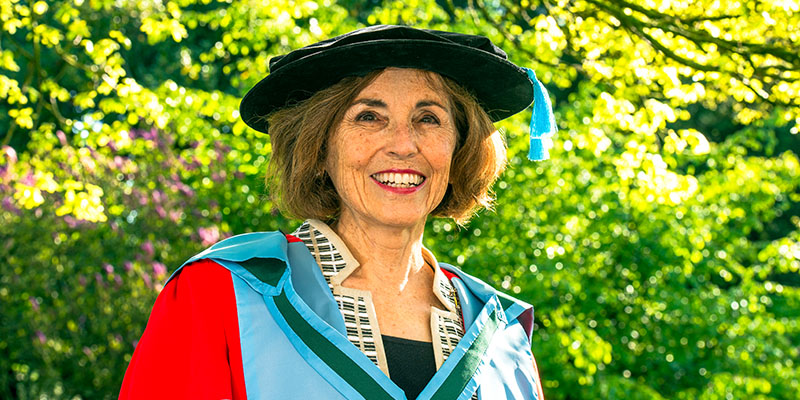Honorary Citation by Professor Paul Callanan for Dr France Cordova

"Good morning, it is my considerable honour to present to you our very distinguished graduand Dr France Córdova, a world leading scientist.
As you know, academics are driven by the core responsibilities to our students of teaching and research, with the important aim of equipping you with the skills you will need in your future careers.
The research activity of a University like UCC is extremely broad, and my own discipline is astronomy. This is an area in which Ireland has a long and proud tradition, extending back at least to the time of Newgrange, and right up to the work of the many astronomers around Ireland today (including those here in UCC). It is also an area where there is a thriving public interest and amateur involvement: few areas in science quite match it for the fundamental questions it addresses.
By its nature of course, astronomy is a challenging science: it requires the most sophisticated instruments to carry out the most sensitive measurements, in patient observation of the sky. Here I am reminded of the comments of the medieval Irish monk Dungal (“the Recluse”), internationally renown for his astronomical expertise in late 700/early 800 AD, who advised the Emperor Charlemange that such things as eclipses could be predicted via “sagacem explorationem et diligentem observationem" - intelligent investigation and industrious observation – a mantra that remains true for astronomy and all areas of research.
Astronomy has since of course been revolutionised by many technological innovations - large telescopes, ingenious detectors for recording light, and observations from space: the latter in particular opens new windows to the universe, inaccessible to ground based observations alone.
Dr France Córdova was drawn into this world of astronomical research. After completing her Bachelor of Arts degree from Stanford University, she completed her PhD in physics from the California Institute of Technology. She carried out novel, space based observations of unusual stars called “white dwarfs” (1 cm3weighs 1 tonne!), and later studying even more extreme objects called “neutron stars” (millions of times denser again), and the most extreme of all, of course, black holes. She was an early pioneer in these studies: these topics remain today at the forefront of astronomy.
After spending time at the Los Alamos National Laboratory, Dr Córdova moved to the Department of Astronomy and Astrophysics in Pennsylvania State University where she lead the department there from 1989 to 1993.
At this point I should perhaps pause and say that such accomplishments would for many be regarded as in themselves the culmination of a very successful academic career. But Dr Córdova did not rest here: instead she embarked on an exceptional series of key leadership roles in several US institutions.
For example Dr Córdova was the vice chancellor for research and professor of physics at the University of California, Santa Barbara, from 1996 to 2002, leading a campus-wide effort to fund and support “blue-sky research”. She then joined the University of California, Riverside, as chancellor and was a distinguished professor of physics and astronomy. There she laid the foundation for a medical school, California's first public medical school in over 40 years.
Dr Córdova then served as president of Purdue University from 2007 to 2012. Amongst her achievements there was the establishment of a College of Health and Human Sciences at Purdue, as well as a Global Research Policy Institute.
But outside of the walls of academia, Dr Córdova also assumed two additional key roles of national leadership.
From 1993 to 1996, Dr Córdova served as NASA's chief scientist. She was the youngest person and first woman to serve as NASA's chief scientist and was awarded the agency's highest honour, the Distinguished Service Medal.
In 2014, Dr Córdova was sworn in as director of the National Science Foundation (NSF) nominated by President Barack Obama. Through her leadership at NSF, the agency expanded significantly, identifying new promising areas of research for targeted investment. She also worked to broaden STEM participation from traditionally underrepresented groups.
It is not surprising then that Dr Córdova’s achievements have been acknowledged by many prestigious awards: she is, for example a fellow of the American Association for the Advancement of Science, the American Academy of Arts and Sciences, and a Kilby Laureate for "significant contributions to society through science, technology, innovation, invention and education”.
She has also been awarded the Kennedy-Lemass Medal from Ireland and is an honorary member of the Royal Irish Academy.
I think it is true to say that Dr Córdova’s combination of academic excellence, strategic foresight and energetic leadership is rare. But anyone who has employed these attributes to the benefit of so many leading institutions of education and research, and on a global scale, for the greater scientific good, is exceptional indeed.
These many achievements demonstrate that Dr Córdova is entirely meritorious of the award of Honorary Doctor of Science, bestowed on her now by the National University of Ireland.
Praehonorabilis Cancellarie, totaque universitas!
Praesento vobis hanc meam filiam, quam scio tam moribus quam doctrina habil em et idoneam esse quae admittatur, honoris causa, ad Gradum DoctoratusScientia, idque tibi fide mea testor ac spondee, totique A cademiae. "
